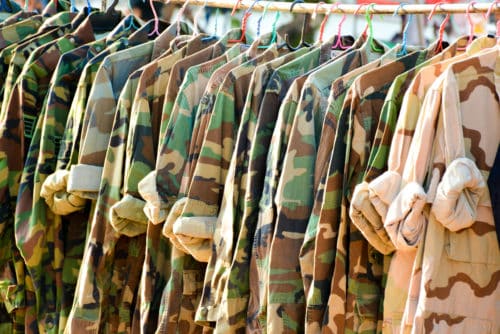Combat and military procedures can potentially expose service members and their equipment to harsh environments, so excellent military fabric performance is paramount. In the past, manufacturers made military uniforms of a cotton twill fabric exclusively, and this heavy fabric met the necessary durability requirements. However, cotton twill isn’t ideal for function or comfort. Infrared light can rebound off shiny synthetic fabrics, creating security concerns. Also, the weight of cotton twill increases when wet, and it can become uncomfortably hot to wear. Today, military uniforms as well as Mil-Spec products incorporate materials that are better suited to their applications.
What Fabrics Are Military Uniforms Made Of?
While cotton and nylon are particularly commonplace in military uniform construction, uniforms are also available in numerous other materials, such as:
- Acrylics
- Canvas
- COOLMAX®
- Kevlar®
- Lycra®
- Nomex® and other meta-aramids
- Polyester
- Polyester vinyl composites
- Vinyl
These materials compensate for the issues experienced with previous fabric compositions while providing military personnel with a broader range of motion.
Military Fabric: Applications
The military relies on specialty fabrics for much more than uniforms. If military supplies don’t feature the right fabric construction, they’re more likely to sustain damage and require repairs while increasing the risk of distraction and harm. Other applications for military fabric include:
- Additional apparel, including hats, ponchos, body armor, utility belts, footwear, and gloves
- Bags, such as backpacks, duffel bags, or water storage bags
- Bedding or sleeping bags
- Covers for helmets, engines, tanks, and turret guns
- Flags
- Parachutes
- Personal protective equipment (PPE)
- Rocket linings
- Ropes, cords, and cables
- Straps and sheaths for carrying weapons
- Tents
- Welding curtains for submarines
Military Fabric: Properties
Ultimately, manufacturers design military fabrics for protection. These materials must hold up under the many potential stressors of military duty, which can include harsh conditions like heat or cold, rain or UV light, as well as military engagements.
To address temperature, manufacturers of military-grade fabrics can use lighter-weight, breathable materials. In uniforms, this allows for air and water permeability, and moisture-wicking to handle sweat. Regarding environmental concerns, waterproofing for materials like tents and covers keeps service members and military equipment dry, also warding off mildew.
Military fabrics can have numerous other resistance properties as well. Manufacturers can design fabric to be resistant to ultraviolet rays as well as fire. For PPE and other applications, antimicrobial treatments can be beneficial. Also, fabrics like cotton offer electrical resistance and, in uniforms, are even advantageous for sensitive skin.
Even when they are lightweight, military fabrics are durable enough to protect uniforms and supplies from tears, abrasion, or general wear that may otherwise develop over time. Military personnel can focus on their missions without any concern over fabric performance.
Military Fabric From HLC Industries
HLC Industries, Inc. meets the needs of contractors and manufacturers responsible for supplying the U.S. Armed Forces, along with other international military organizations. We provide a wide array of materials based on our customers’ specifications, specializing in light- to heavy-weight woven textiles for a range of applications that are specific to each mission.
All of our products are made in the U.S. and are Berry Amendment Compliant. We also offer superior nylon woven fabrics as an ISO 9001:2015 certified manufacturer, with the ability to produce fabrics ranging in weight from 1.1 oz. to 12 oz.
To manufacture our products, we use top-of-the-line machinery in our fully equipped facility. We also offer finishing services using a variety of finishing equipment, including contact heat dryers, pin and clip tenter frames, and calendars. This equipment enables us to provide water-repellent finishes, fire-retardant finishes, dip and face finishing, resin finishes for military boots, and wickable and antimicrobial treatments.
To find the right military fabric for your application, view our product line in our extensive catalog. For assistance with product selection and to receive material samples and swatches, request a quote and we’ll connect you with one of our sales representatives.


